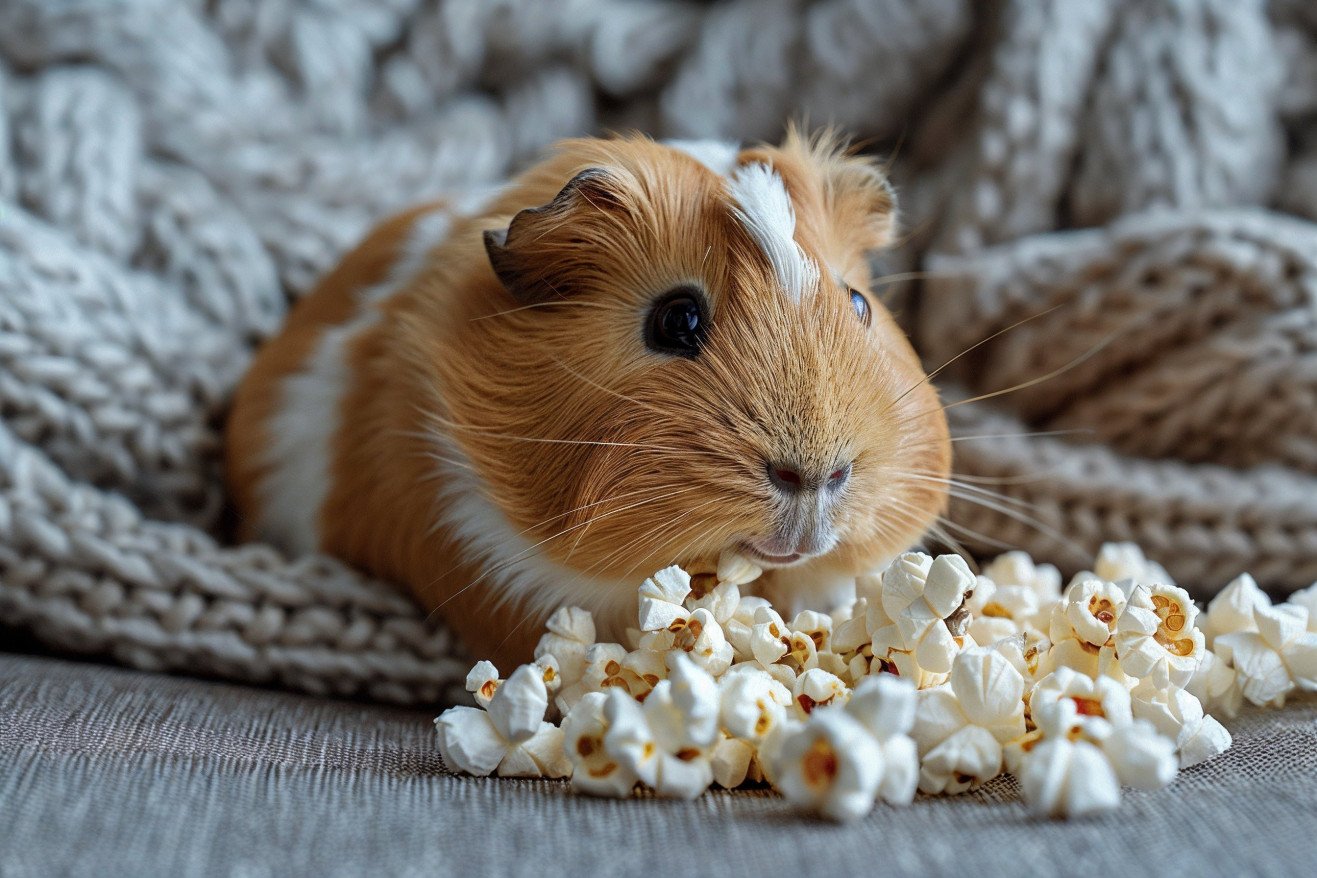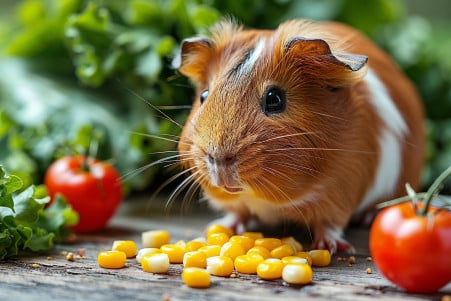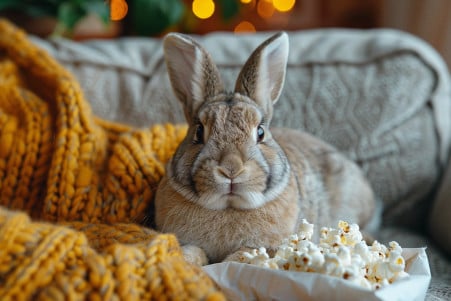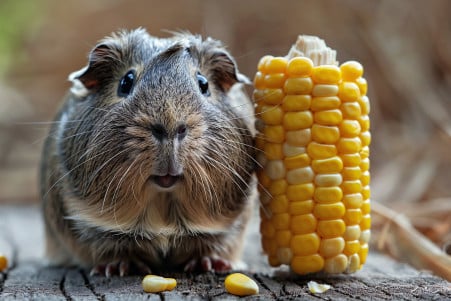Can Guinea Pigs Eat Popcorn? A Closer Look at This Snack
15 May 2024 • Updated 15 May 2024

Whether you're eating a bowl of buttery popcorn or a bag of kettle corn, you might be tempted to share your snack with your guinea pig. While popcorn isn't poisonous to guinea pigs, it's high in carbohydrates and low in the nutrients that guinea pigs need. While a small amount of popcorn is unlikely to cause any issues, it's best to avoid giving it to your guinea pig on a regular basis.
By looking at nutritional information and seeking advice from veterinarians, we'll explore whether or not it's a good idea to give your guinea pig popcorn. We'll also cover what guinea pigs should eat and what they need to stay healthy, so you can make informed decisions about giving your guinea pig human food like popcorn as a treat.
Can guinea pigs eat popcorn?
Nutritional Information for Popcorn
While popcorn may seem like a safe and healthy snack, it is not nutritionally adequate for guinea pigs and can be problematic in several ways. As noted by Pet Keen, popcorn is high in starch, which can be hard for guinea pigs to digest. It is also low in fiber, vitamins, and minerals, all of which are important for a guinea pig's diet.
In addition, the hard, small, and crunchy nature of popcorn kernels can be a choking hazard that could be life-threatening if not treated quickly. Finally, many microwave popcorns are flavored and contain added oils and preservatives that can be harmful to guinea pigs' sensitive digestive systems, according to Hepper.
While an occasional piece of plain popcorn may not be immediately harmful, the lack of nutritional value and potential dangers of popcorn make it a less-than-ideal treat for guinea pigs. Instead, focus on feeding your guinea pig a diet that is nutritionally complete and balanced, including hay, fresh vegetables, and fortified pellets.
What to Feed Your Guinea Pig and Healthy Snacks
Guinea pigs are herbivores, so their diet should be made up of plant-based foods. The most important part of their diet is fresh hay, like timothy hay. The Humane Society of the United States says that fresh hay should be available in unlimited amounts every day and should make up about 80% of a guinea pig's diet. Hay helps them digest their food and keeps their teeth from getting too long.
In addition to hay, guinea pigs should be given a small amount of guinea pig pellets that are fortified with vitamin C once a day and fresh vegetables, like leafy greens, bell peppers, and carrots. Small Pet Select recommends giving each guinea pig about one cup of fresh vegetables a day. Fruits can be given as treats, but they should be given sparingly because of their high sugar content.
When it comes to healthy snacks, GuineaDad suggests things like chamomile, dandelion leaf, marigold, raspberry leaf, rose hips, and pea flakes. These snacks have a variety of benefits, from helping with anxiety to aiding in digestion and boosting the immune system. Just remember to give these snacks in moderation.
Potential Hazards and Signs of Popcorn Ingestion
If a guinea pig eats too much popcorn, it can lead to digestive problems like bloating, gas, and diarrhea. As noted by Guinea Pig Poisoning Symptoms + Treatment + Prevention, the hard, crunchy nature of popcorn kernels can be a choking hazard and may even cause blockages in the intestines. In addition, the seasonings and other ingredients in some types of popcorn can be toxic or cause other negative reactions in guinea pigs.
The same article explains that potential signs of poisoning or digestive issues include weakness, tremors, breathing problems, and severe diarrhea. If a guinea pig experiences any of these symptoms after eating popcorn, it's important to get them to a vet as soon as possible.
Introducing New Foods and Transitioning Diets
Guinea pigs have sensitive digestive systems that can be thrown off by sudden dietary changes. As noted by Mazuri, when introducing new foods or transitioning to a new diet, it is important to take at least 7-10 days to gradually make the change. GuineaDad suggests starting with small amounts of the new food and gradually reducing the old food, then slowly increasing the new food.
It's important to keep an eye on your guinea pig's weight, behavior, and appetite throughout the transition. As mentioned by Oxbow Animal Health, trying to rush the transition can lead to digestive upset and diet refusal, so it's important to be patient. If you notice any problems, make sure to see a vet right away.
Potential Health Problems Due to Poor Nutrition
Poor nutrition can lead to a variety of health problems in guinea pigs. According to VCA Animal Hospitals, one of the most common issues is vitamin C deficiency, or scurvy, which can cause dry, brittle hair, swollen joints, and bleeding gums. This is because guinea pigs, like humans and other primates, are unable to synthesize their own vitamin C and must obtain it from their diet.
Another big concern is gastrointestinal stasis, which is a painful and potentially deadly condition that occurs when the gut microbiome is disrupted, according to the Merck Veterinary Manual. Dental problems, including malocclusion, can also be caused by a lack of abrasive fiber in the diet.
Other problems that can result from poor nutrition include bladder stones, arthritis, and pregnancy toxemia (ketosis) in pregnant females, according to VCA Animal Hospitals. It's important to make sure your guinea pig is eating a diet that's appropriate for their species and that includes plenty of hay, fresh vegetables, and essential nutrients to prevent these issues and keep them healthy.
Wrapping Up: Popcorn and Guinea Pigs
While it may not be immediately harmful for your guinea pig to have a nibble of unsalted, unbuttered popcorn, it's not something you should be feeding them regularly. It doesn't have the nutrients and fiber that your guinea pig needs, and it can also lead to other problems like choking and digestive issues.
It's important to make sure that your guinea pig is getting a balanced diet that includes fresh hay, vitamin C-fortified pellets, and a variety of fresh vegetables. This will help ensure that they stay healthy and happy. Make sure that you know what your guinea pig's dietary needs are and that you're not feeding them things that are meant for humans, like popcorn, and you'll be able to help them live a long and healthy life.


